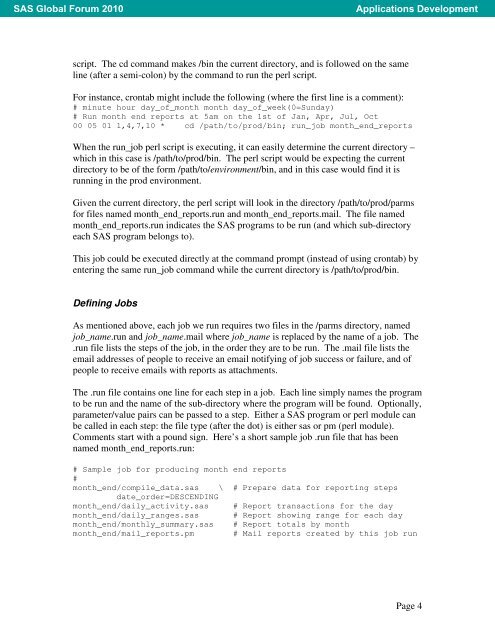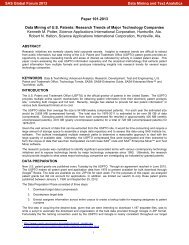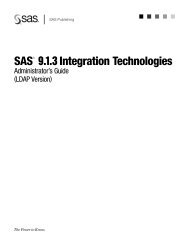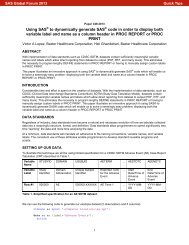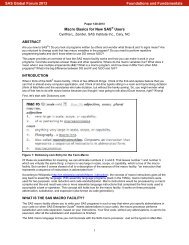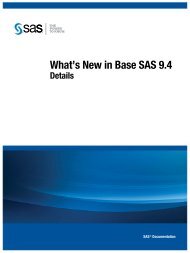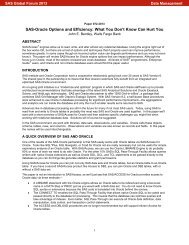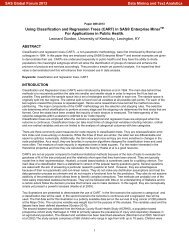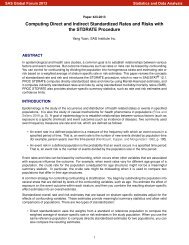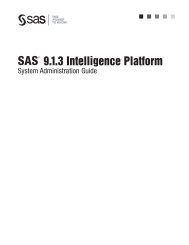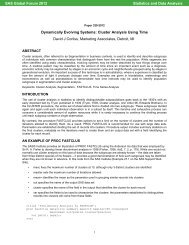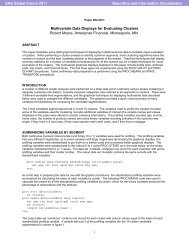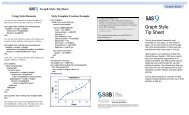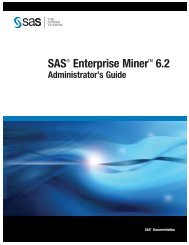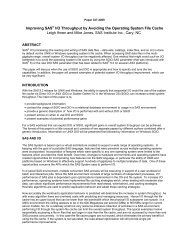A Robust and Flexible Approach to Automating SAS® Jobs Under ...
A Robust and Flexible Approach to Automating SAS® Jobs Under ...
A Robust and Flexible Approach to Automating SAS® Jobs Under ...
You also want an ePaper? Increase the reach of your titles
YUMPU automatically turns print PDFs into web optimized ePapers that Google loves.
SAS Global Forum 2010<br />
Applications Development<br />
script. The cd comm<strong>and</strong> makes /bin the current direc<strong>to</strong>ry, <strong>and</strong> is followed on the same<br />
line (after a semi-colon) by the comm<strong>and</strong> <strong>to</strong> run the perl script.<br />
For instance, crontab might include the following (where the first line is a comment):<br />
# minute hour day_of_month month day_of_week(0=Sunday)<br />
# Run month end reports at 5am on the 1st of Jan, Apr, Jul, Oct<br />
00 05 01 1,4,7,10 * cd /path/<strong>to</strong>/prod/bin; run_job month_end_reports<br />
When the run_job perl script is executing, it can easily determine the current direc<strong>to</strong>ry –<br />
which in this case is /path/<strong>to</strong>/prod/bin. The perl script would be expecting the current<br />
direc<strong>to</strong>ry <strong>to</strong> be of the form /path/<strong>to</strong>/environment/bin, <strong>and</strong> in this case would find it is<br />
running in the prod environment.<br />
Given the current direc<strong>to</strong>ry, the perl script will look in the direc<strong>to</strong>ry /path/<strong>to</strong>/prod/parms<br />
for files named month_end_reports.run <strong>and</strong> month_end_reports.mail. The file named<br />
month_end_reports.run indicates the SAS programs <strong>to</strong> be run (<strong>and</strong> which sub-direc<strong>to</strong>ry<br />
each SAS program belongs <strong>to</strong>).<br />
This job could be executed directly at the comm<strong>and</strong> prompt (instead of using crontab) by<br />
entering the same run_job comm<strong>and</strong> while the current direc<strong>to</strong>ry is /path/<strong>to</strong>/prod/bin.<br />
Defining <strong>Jobs</strong><br />
As mentioned above, each job we run requires two files in the /parms direc<strong>to</strong>ry, named<br />
job_name.run <strong>and</strong> job_name.mail where job_name is replaced by the name of a job. The<br />
.run file lists the steps of the job, in the order they are <strong>to</strong> be run. The .mail file lists the<br />
email addresses of people <strong>to</strong> receive an email notifying of job success or failure, <strong>and</strong> of<br />
people <strong>to</strong> receive emails with reports as attachments.<br />
The .run file contains one line for each step in a job. Each line simply names the program<br />
<strong>to</strong> be run <strong>and</strong> the name of the sub-direc<strong>to</strong>ry where the program will be found. Optionally,<br />
parameter/value pairs can be passed <strong>to</strong> a step. Either a SAS program or perl module can<br />
be called in each step: the file type (after the dot) is either sas or pm (perl module).<br />
Comments start with a pound sign. Here’s a short sample job .run file that has been<br />
named month_end_reports.run:<br />
# Sample job for producing month end reports<br />
#<br />
month_end/compile_data.sas \ # Prepare data for reporting steps<br />
date_order=DESCENDING<br />
month_end/daily_activity.sas # Report transactions for the day<br />
month_end/daily_ranges.sas # Report showing range for each day<br />
month_end/monthly_summary.sas # Report <strong>to</strong>tals by month<br />
month_end/mail_reports.pm # Mail reports created by this job run<br />
Page 4


